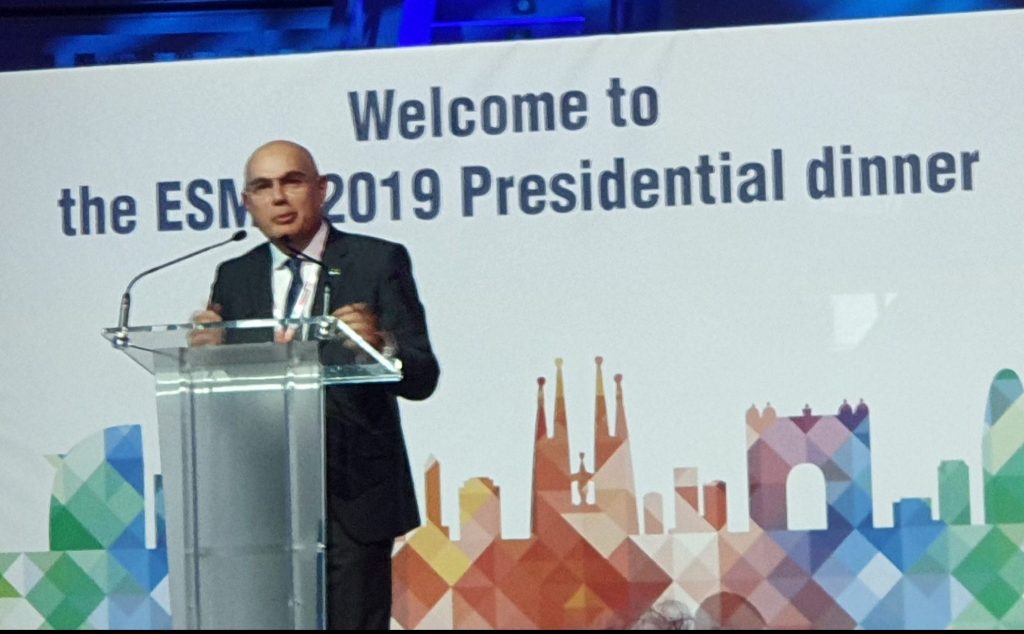IMvigor130 randomly allocated 1,213 patients with metastatic urothelial cancer from 35 countries in a 1:1:1 ratio to atezolizumab plus platinum-based chemotherapy (Arm A), atezolizumab alone (Arm B), or placebo plus platinum-based chemotherapy (Arm C). IMvigor130 is the first trial to test the combination of chemotherapy and immunotherapy in patients eligible and ineligible for chemotherapy.
The coprimary efficacy endpoints were investigator-assessed PFS and overall survival (Arm A vs C) and overall survival (Arm B vs C). After a median follow-up of 11.8 months, median PFS was 8.2 months in Arm A and 6.3 months in Arm C. This corresponded to a statistically significant HR of 0.82 (95% CI 0.70–0.96; P=0.007).
In an interim analysis, median overall survival was 16.0 vs 13.4 months in Arms A and C, respectively (HR 0.83; 95% CI 0.69–1.00; P=0.027) and 15.7 vs 13.1 months in Arms B and C, respectively (HR 1.02; 95% CI 0.83–1.24).
Objective response rates were 47%, 23%, and 44% in Arms A, B, and C, respectively; complete response rates were 13%, 6%, and 7%. Adverse events leading to treatment withdrawal occurred in 34%, 6%, and 34% of patients in Arms A, B, and C, respectively.
Compared with chemotherapy alone, chemotherapy plus atezolizumab improved the median time to progression of metastatic tumours by 2 months. Patients receiving the combination had an 18% reduced likelihood of progression. Interim analysis of overall survival showed a trend for improvement with the combination, but it was not statistically significant. There was also a trend for improved survival in patients with overexpression of PD-L1 who were treated with atezolizumab alone compared with chemotherapy.
Presenting author Dr Enrique Grande (MD Anderson Cancer Centre Madrid, Spain), said the adverse effects from combined chemotherapy and immunotherapy were consistent with studies in other solid tumours. “This is a new option for the upfront treatment of patients with metastatic urothelial cancer. Longer follow-up is needed on overall survival and we will continue to search for biomarkers to identify which patients respond best to this therapy.”
Commenting on the results, Dr Ignacio Durán (Hospital Universitario Marques de Valdecilla-IDIVAL, Spain) cautioned that this improvement in PFS may be insufficient for regulatory approval at this stage, but said the data look promising. Dr Durán also noted that the observed complete responses were around twice as likely with the combination compared with chemotherapy or immunotherapy alone. “This is remarkable. We are now eager to see if patients receiving the two therapies together live longer, and with a similar quality of life, compared with those receiving chemotherapy and immunotherapy alone or sequentially. The interim analysis of overall survival seems to be promising, but data are immature: overall survival data are needed to consider the combination of chemotherapy and immunotherapy as a new standard of care,” he said.
- Grande E et al. ESMO Congress 2019. Abstract LBA14_PR.
Posted on
Previous Article
« Liquid biopsy identifies relapse in patients with colorectal cancer after surgery Next Article
PARP inhibition in selected patients slows progression on advanced prostate cancer »
« Liquid biopsy identifies relapse in patients with colorectal cancer after surgery Next Article
PARP inhibition in selected patients slows progression on advanced prostate cancer »
Table of Contents: ESMO 2019
Featured articles
Interview with ESMO President Prof. Josep Tabernero
Breast Cancer
Triple negative breast cancer gets positive news: KEYNOTE-522 interim results
CDK4/6 inhibitors change landscape of breast cancer treatment: 2 studies
Veliparib-chemo combo prolongs survival without disease progression in some advanced breast cancer patients
Lung Cancer
Improved response rates without survival benefit with pembrolizumab in pretreated mesothelioma
Frontline ipilimumab/nivolumab improves OS in advanced NCLSC
First-line osimertinib significantly lengthens OS in NSCLC
Liquid biopsy to decide the best treatment for NSCLC
Melanoma
Long-term data from CheckMate 067
Adjuvant nivolumab provides benefit
Nivolumab+ipilimumab superior to monotherapy for melanoma brain metastases
GI Cancers
Preoperative chemotherapy for colon cancer
Nivolumab improves OS in advanced oesophageal cancer
Liquid biopsy identifies relapse in patients with colorectal cancer after surgery
In hepatocellular carcinoma, CheckMate 459 misses OS endpoint, but some interesting trends emerge
Heavily pre-treated GIST: ripretinib improves PFS
FGFR2+ cholangiocarcinoma: pemigatinib active as second-line treatment
IDH1+ cholangiocarcinoma: phase 3 results show improved PFS
Advanced colorectal cancer and BRAF mutations: triplet combination improves survival
Genitourinary Cancers
25% reduction in the risk of death in patients with nmCRPC treated with apalutamide
Enfortumab vedotin and pembrolizumab in advanced bladder cancer: initial results
PARP inhibition in selected patients slows progression on advanced prostate cancer
PFS extension with immunotherapy + chemotherapy in urothelial cancer
Third-line in mCRPC: CARD trial
Prostate cancer: spare radiotherapy after surgery
Novel mode of action for kidney cancer treatment
Gynaecological Cancers
Ovarian cancer patients benefit from combined maintenance therapy
Combination of PARP inhibition plus chemotherapy in ovarian cancer
PFS benefit with niraparib as first-line maintenance in ovarian cancer
CNS Tumours
Ceritinib in ALK+ NSCLC brain metastases
Solid Tumours/Pan-Tumour Data
Mixed data: AMG 510 in tumours with KRASG12C
DNA profiling of carcinoma of unknown primary should inform treatment
Larotrectinib: safe and effective in TRK fusion-positive tumours
Related Articles

November 26, 2019
Interview with ESMO President Prof. Josep Tabernero
November 26, 2019
Prostate cancer: spare radiotherapy after surgery
November 26, 2019
DNA profiling of carcinoma of unknown primary should inform treatment
© 2024 Medicom Medical Publishers. All rights reserved. Terms and Conditions | Privacy Policy
HEAD OFFICE
Laarderhoogtweg 25
1101 EB Amsterdam
The Netherlands
T: +31 85 4012 560
E: publishers@medicom-publishers.com

